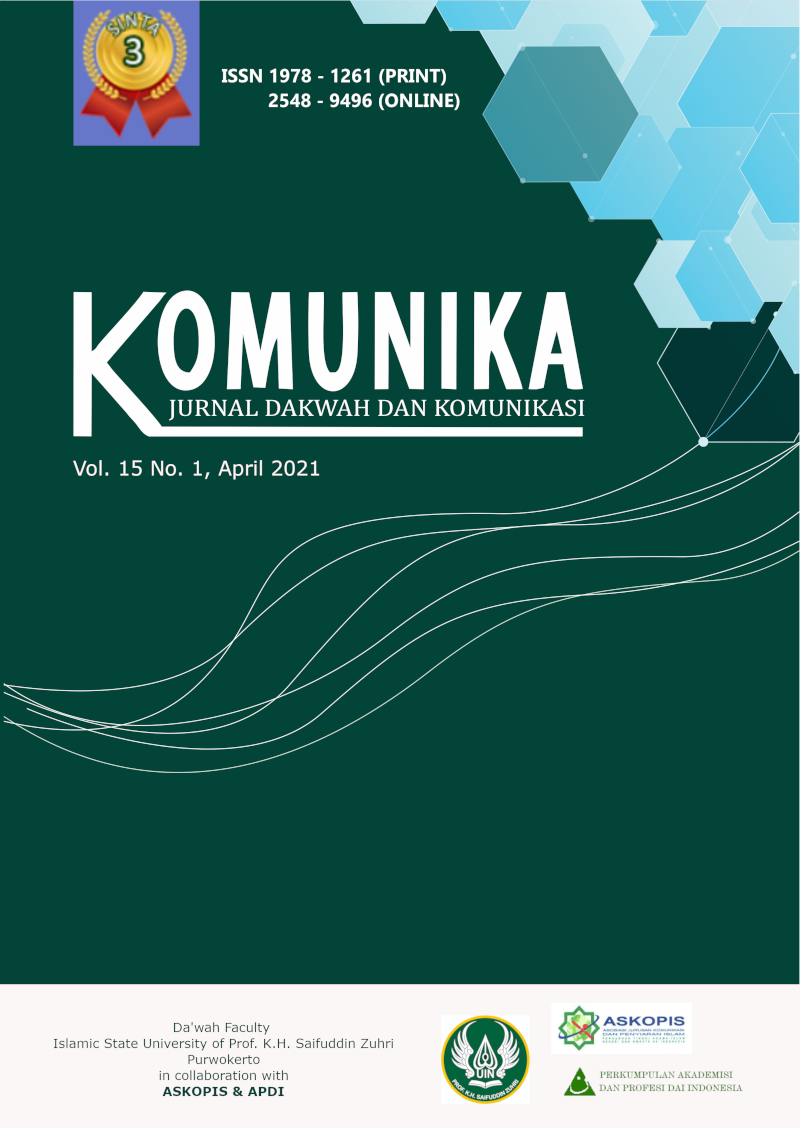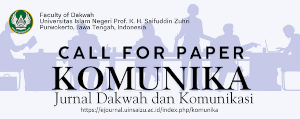Construction of Public Opinion about Religious Moderation on NU Online Instagram Accounts (@nuonline_id)
DOI:
https://doi.org/10.24090/komunika.v15i1.4572Keywords:
Instagram, @nuonline_id, public opinion, religious moderationAbstract
This study tries to describe how NU Online constructs the content of religious moderation in influencing public opinion. Starting from the development of social media in the digital era, which plays a significant role in building public opinion and culture, NU Online uses Instagram (@nuonline_id) to spread the concept of moderation. The spread of the moderation message aims to maintain the country’s integrity and prevent radicalism or extremism in religion. This research is descriptive qualitative research. The study conducts by online observations of the @nuonline_id Instagram page to detect religious moderation content. This study succeeded in finding the construction of religious moderation on the @nuonline_id account using text analysis (images and text). The study results explain that NU Online carries out the structure of religious moderation in six aspects of life: (a) Aspects of inter-religious relations. In this aspect, NU Online invites Muslims to maintain harmony with people of different religions. (b) Aspects of social life by suggesting the Indonesian people live in harmony with each other as Indonesian citizens. (c) Political factors and state management by asking the government to develop moderation in carrying out their duties. (d) The education aspect is by the inculcation of the moderation concept in the curriculum. (e) Legal aspects and understanding of religious texts encourage Islamic scholars to consider the religious context in establishing laws. (f) Economic factors, taking into economic equity.Downloads
Download data is not yet available.
References
Abidin, Z. (2013). Islam Inklusif: Telaah Atas Doktrin dan Sejarah. HUmaniora, 4(2). https://doi.org/10.21512/humaniora.v4i2.3571
Akhmadi, A. (2019). Moderasi Beragama Dalam Keragaman Indonesia Religious Moderation in Indonesia ’ S Diversity. Jurnal Diklat Keagamaan, 13(2), 45–55.
Alkhotob, I. T. A. (2019). Pers Dan Jurnalistik Da’Wah Dalam Membangun Opini Publik. Jurnal Da’wah: Risalah Merintis, Da’wah Melanjutkan, 3(01), 53–67. https://doi.org/10.38214/jurnaldawahstidnatsir.v3i01.60
Almu’tasim, A. (2017). Berkaca NU dan Muhammadiyah dalam Mewujudkan Nilai-nilai Moderasi Islam di Indonesia. Tarbiya Islamia, VII(2). https://doi.org/10.36815/tarbiya.v8i2.474
Aziz, A. Z. A. (2020). OPTIMASI INSTAGRAM SEBAGAI MEDIA PENYAMPAIAN PESAN DAKWAH. 21(1), 1–9.
Aziz, F. A. (2019). Mengikis Arogansi Berdakwah Melalui Pendekatan Manajemen Perencanaan Islami. KOMUNIKA: Jurnal Dakwah Dan Komunikasi, 13(1). https://doi.org/0.24090/komunika.v13i1.2029
Brahmana, R. K., & You, H. W. (2021). Do Muslim CEOs and Muslim stakeholders prefer Islamic debt financing? Global Finance Journal. https://doi.org/10.1016/j.gfj.2021.100625
Castaño-PulgarÃn, S. A., Suárez-Betancur, N., Vega, L. M. T., & López, H. M. H. (2021). Internet, Social Media and Online Hate Speech. Systematic Review. Aggression and Violent Behavior, 58(May-June). https://doi.org/10.1016/j.avb.2021.101608
Ekawati, E. (2016). Nahdlatul Ulama (Nu) Sebagai Civil Society Di Indonesia. NUANSA: Jurnal Penelitian Ilmu Sosial Dan Keagamaan Islam, 13(2), 233. https://doi.org/10.19105/nuansa.v13i2.1098
Fahri, M., & Zainuri, A. (2019). Moderasi Beragama di Indonesia. Intizar, 25(2), 95–100.
Faiqah, N., & Pransiska, T. (2018). Radikalisme Islam Vs Moderasi Islam: Upaya Membangun Wajah Islam Indonesia Yang Damai. Al-Fikra : Jurnal Ilmiah Keislaman, 17(1), 33. https://doi.org/10.24014/af.v17i1.5212
Ghifari, I. F. (2017). Radikalisme di Internet. Religious: Jurnal Studi Agama-Agama Dan Lintas Budaya, 1(2), 123. https://doi.org/10.15575/rjsalb.v1i2.1391
Gregorio, G. De. (2020). Democratizing Online Content Moderation: A ConstitutionalFframework. Computer Law & Security Review, 36. https://doi.org/10.1016/j.clsr.2019.105374
Gusnanda, & Nuraini. (2020). Menimbang Urgensi Ukhuwah Wathaniyah dalam Kasus Intoleransi Beragama di Indonesia. FUADUNA: Jurnal Kajian Keagamaan Dan Kemasyarakatan, 4(1). https://doi.org/10.30983/fuaduna.v4i1.3237
Habibie, D. K. (2018). Dwi Fungsi Media Massa. Interaksi: Jurnal Ilmu Komunikasi, 7(2), 79. https://doi.org/10.14710/interaksi.7.2.79-86
Hartmann, I. A. (2020). A New Framework for Online Content Moderation. Computer Law & Security Review, 36(4).
Ismail, F. (2020). NU Moderatisme dan Pluralisme. IRCiSod.
Karim, H. A. (2019). Implementasi Moderasi Pendidikan Islam Rahmatallil ’Alamin dengan Nilai-nilai Islam. RI’AYAH, 4(1). https://doi.org/10.32332/riayah.v4i01.1486
Kosasih, E. (2019). Literasi Media Sosial dalam Pemasyarakatan Sikap Moderasi Beragama. Jurnal Bimas Islam, 12(1). https://doi.org/10.37302/jbi.v12i2.118
Kuntarto, Widyaningsih, R., & Chamadi, M. R. (2021). The Hoax of SARA ( Tribe, Religion, Race, and Intergroup ) as a Threat to the Ideology of Pancasila Resilience. Jurnal Ilmiah Peuradeun, 9(2), 413–434. https://doi.org/10.26811/peuradeun.v9i2.
Li, Y., & Sai, Q. (2020). The effects of language and religion on cross-border acquisition completion. Research in International Business and Finance, 54. https://doi.org/10.1016/j.ribaf.2020.101294
Nafisah, L. (2019). Urgensi Pemahaman Hadis Kontekstual. UNIVERSUM, 13(1).
Qadri, M. (2020). Pengaruh Media Sosial dalam Membangun Opini Publik. Qoumiyyah: Jurnal Hukum Tata Negara, 1(1).
Rosmarin, D. H., Alper, D. A., & Pargament, K. I. (2016). Religion, Spirituality, and Mental Health. Encyclopedia of Mental Health (Second Edition), 23–27. https://doi.org/10.1016/B978-0-12-397045-9.00190-7
Sakti, B. C., & Yulianto, M. (2013). Penggunaan Media Sosial Instagram Dalam Pembentukan Identitas Diri Remaja. Interaksi-Online, 6(4), 1–12.
Sanusi. (2015). Merajut Nalar Fiqh Kontekstual. Yudisia, 6(2). https://doi.org/10.21043/yudisia.v6i2.1470
Sasaki, J. Y., & Kim, H. S. (2021). The Ego Dampening Influence of Religion: Evidence from Behavioral Genetics and Psychology. Current Opinion in Psychology, 40, 24–28.
Shihab, M. Q. (2020). Wasathiyah: Wawasan Islam tentang Moderasi Beragama. PT. Lentera Hati.
Syamsudin, M. (2020). Hukum Penggunaan Dinar dan Dirham Sebagai Alat Tukar. Https://Islam.Nu.or.Id/Post/Read/117332/Hukum-Penggunaan-Dinar-Dan-Dirham-Sebagai-Alat-Tukar.
Taufik, A. (2014). Hubungan Antar Umat Beragama (Studi Kritis Metodologi Penafsiran Tekstual). Journal of Qur’an Hadith Studies, 3(2).
Tomi Hendra, S. S. (2020). Tantangan Dakwah Dalam Arus Perkembangan Komunikasi Media Sosial. Al Hikmah, 7, 50–60.
Wang, J., & Wang, C. (2021). Can Religions Explain Cross Country Differences in Innovative Activities? Technovation, 107. https://doi.org/10.1016/j.technovation.2021.102285
Wibowo, A. (2019). Kampanye Moderasi Beragama di Facebook: Bentuk dan Strategi Pesan. EDUGAMA: Jurnal Kependidikan Dan Sosial Keagamaan, 5(2). https://doi.org/10.32923/edugama.v5i2.971
Widyaningsih, R. (2019). Deteksi Dini Radikalisme. Unsoed Press.
Widyaningsih, R., Kuntarto, K., & Chamadi, M. (2020). Community-based Prevention of Radicalism: Psychosocial Perspective of Radicalism in Indonesia. CELL 2019, January, 1–13. https://doi.org/10.4108/eai.5-8-2019.2289786
Widyaningsih, R., Sumiyem, S., & Kuntarto, K. (2017). The Potential of Religious Radicalism Movement in Banyumas. Walisongo: Jurnal Penelitian Sosial Keagamaan, 25(1), 203. https://doi.org/10.21580/ws.25.1.1807
Winata, K. A., Solihin, I., Ruswandi, U., & Erihadiana, M. (2020). Moderasi Islam dalam Pembelajaran PAI Melalui Model Pembelajaran kontekstual. CIENCIAS: Jurnal Penelitian Dan Pengembangan Pendidikan, 3(2).
Yahya, M., & Farhan, F. (2019). Dakwah Virtual Masyarakat Bermedia Online. Briliant: Jurnal Riset Dan Konseptual, 4(2), 249. https://doi.org/10.28926/briliant.v4i2.320
Akhmadi, A. (2019). Moderasi Beragama Dalam Keragaman Indonesia Religious Moderation in Indonesia ’ S Diversity. Jurnal Diklat Keagamaan, 13(2), 45–55.
Alkhotob, I. T. A. (2019). Pers Dan Jurnalistik Da’Wah Dalam Membangun Opini Publik. Jurnal Da’wah: Risalah Merintis, Da’wah Melanjutkan, 3(01), 53–67. https://doi.org/10.38214/jurnaldawahstidnatsir.v3i01.60
Almu’tasim, A. (2017). Berkaca NU dan Muhammadiyah dalam Mewujudkan Nilai-nilai Moderasi Islam di Indonesia. Tarbiya Islamia, VII(2). https://doi.org/10.36815/tarbiya.v8i2.474
Aziz, A. Z. A. (2020). OPTIMASI INSTAGRAM SEBAGAI MEDIA PENYAMPAIAN PESAN DAKWAH. 21(1), 1–9.
Aziz, F. A. (2019). Mengikis Arogansi Berdakwah Melalui Pendekatan Manajemen Perencanaan Islami. KOMUNIKA: Jurnal Dakwah Dan Komunikasi, 13(1). https://doi.org/0.24090/komunika.v13i1.2029
Brahmana, R. K., & You, H. W. (2021). Do Muslim CEOs and Muslim stakeholders prefer Islamic debt financing? Global Finance Journal. https://doi.org/10.1016/j.gfj.2021.100625
Castaño-PulgarÃn, S. A., Suárez-Betancur, N., Vega, L. M. T., & López, H. M. H. (2021). Internet, Social Media and Online Hate Speech. Systematic Review. Aggression and Violent Behavior, 58(May-June). https://doi.org/10.1016/j.avb.2021.101608
Ekawati, E. (2016). Nahdlatul Ulama (Nu) Sebagai Civil Society Di Indonesia. NUANSA: Jurnal Penelitian Ilmu Sosial Dan Keagamaan Islam, 13(2), 233. https://doi.org/10.19105/nuansa.v13i2.1098
Fahri, M., & Zainuri, A. (2019). Moderasi Beragama di Indonesia. Intizar, 25(2), 95–100.
Faiqah, N., & Pransiska, T. (2018). Radikalisme Islam Vs Moderasi Islam: Upaya Membangun Wajah Islam Indonesia Yang Damai. Al-Fikra : Jurnal Ilmiah Keislaman, 17(1), 33. https://doi.org/10.24014/af.v17i1.5212
Ghifari, I. F. (2017). Radikalisme di Internet. Religious: Jurnal Studi Agama-Agama Dan Lintas Budaya, 1(2), 123. https://doi.org/10.15575/rjsalb.v1i2.1391
Gregorio, G. De. (2020). Democratizing Online Content Moderation: A ConstitutionalFframework. Computer Law & Security Review, 36. https://doi.org/10.1016/j.clsr.2019.105374
Gusnanda, & Nuraini. (2020). Menimbang Urgensi Ukhuwah Wathaniyah dalam Kasus Intoleransi Beragama di Indonesia. FUADUNA: Jurnal Kajian Keagamaan Dan Kemasyarakatan, 4(1). https://doi.org/10.30983/fuaduna.v4i1.3237
Habibie, D. K. (2018). Dwi Fungsi Media Massa. Interaksi: Jurnal Ilmu Komunikasi, 7(2), 79. https://doi.org/10.14710/interaksi.7.2.79-86
Hartmann, I. A. (2020). A New Framework for Online Content Moderation. Computer Law & Security Review, 36(4).
Ismail, F. (2020). NU Moderatisme dan Pluralisme. IRCiSod.
Karim, H. A. (2019). Implementasi Moderasi Pendidikan Islam Rahmatallil ’Alamin dengan Nilai-nilai Islam. RI’AYAH, 4(1). https://doi.org/10.32332/riayah.v4i01.1486
Kosasih, E. (2019). Literasi Media Sosial dalam Pemasyarakatan Sikap Moderasi Beragama. Jurnal Bimas Islam, 12(1). https://doi.org/10.37302/jbi.v12i2.118
Kuntarto, Widyaningsih, R., & Chamadi, M. R. (2021). The Hoax of SARA ( Tribe, Religion, Race, and Intergroup ) as a Threat to the Ideology of Pancasila Resilience. Jurnal Ilmiah Peuradeun, 9(2), 413–434. https://doi.org/10.26811/peuradeun.v9i2.
Li, Y., & Sai, Q. (2020). The effects of language and religion on cross-border acquisition completion. Research in International Business and Finance, 54. https://doi.org/10.1016/j.ribaf.2020.101294
Nafisah, L. (2019). Urgensi Pemahaman Hadis Kontekstual. UNIVERSUM, 13(1).
Qadri, M. (2020). Pengaruh Media Sosial dalam Membangun Opini Publik. Qoumiyyah: Jurnal Hukum Tata Negara, 1(1).
Rosmarin, D. H., Alper, D. A., & Pargament, K. I. (2016). Religion, Spirituality, and Mental Health. Encyclopedia of Mental Health (Second Edition), 23–27. https://doi.org/10.1016/B978-0-12-397045-9.00190-7
Sakti, B. C., & Yulianto, M. (2013). Penggunaan Media Sosial Instagram Dalam Pembentukan Identitas Diri Remaja. Interaksi-Online, 6(4), 1–12.
Sanusi. (2015). Merajut Nalar Fiqh Kontekstual. Yudisia, 6(2). https://doi.org/10.21043/yudisia.v6i2.1470
Sasaki, J. Y., & Kim, H. S. (2021). The Ego Dampening Influence of Religion: Evidence from Behavioral Genetics and Psychology. Current Opinion in Psychology, 40, 24–28.
Shihab, M. Q. (2020). Wasathiyah: Wawasan Islam tentang Moderasi Beragama. PT. Lentera Hati.
Syamsudin, M. (2020). Hukum Penggunaan Dinar dan Dirham Sebagai Alat Tukar. Https://Islam.Nu.or.Id/Post/Read/117332/Hukum-Penggunaan-Dinar-Dan-Dirham-Sebagai-Alat-Tukar.
Taufik, A. (2014). Hubungan Antar Umat Beragama (Studi Kritis Metodologi Penafsiran Tekstual). Journal of Qur’an Hadith Studies, 3(2).
Tomi Hendra, S. S. (2020). Tantangan Dakwah Dalam Arus Perkembangan Komunikasi Media Sosial. Al Hikmah, 7, 50–60.
Wang, J., & Wang, C. (2021). Can Religions Explain Cross Country Differences in Innovative Activities? Technovation, 107. https://doi.org/10.1016/j.technovation.2021.102285
Wibowo, A. (2019). Kampanye Moderasi Beragama di Facebook: Bentuk dan Strategi Pesan. EDUGAMA: Jurnal Kependidikan Dan Sosial Keagamaan, 5(2). https://doi.org/10.32923/edugama.v5i2.971
Widyaningsih, R. (2019). Deteksi Dini Radikalisme. Unsoed Press.
Widyaningsih, R., Kuntarto, K., & Chamadi, M. (2020). Community-based Prevention of Radicalism: Psychosocial Perspective of Radicalism in Indonesia. CELL 2019, January, 1–13. https://doi.org/10.4108/eai.5-8-2019.2289786
Widyaningsih, R., Sumiyem, S., & Kuntarto, K. (2017). The Potential of Religious Radicalism Movement in Banyumas. Walisongo: Jurnal Penelitian Sosial Keagamaan, 25(1), 203. https://doi.org/10.21580/ws.25.1.1807
Winata, K. A., Solihin, I., Ruswandi, U., & Erihadiana, M. (2020). Moderasi Islam dalam Pembelajaran PAI Melalui Model Pembelajaran kontekstual. CIENCIAS: Jurnal Penelitian Dan Pengembangan Pendidikan, 3(2).
Yahya, M., & Farhan, F. (2019). Dakwah Virtual Masyarakat Bermedia Online. Briliant: Jurnal Riset Dan Konseptual, 4(2), 249. https://doi.org/10.28926/briliant.v4i2.320
Downloads
Published
2021-06-30
Issue
Section
Articles
License
Authors who publish with this journal agree to the following terms:
- Authors retain copyright and grant the journal right of first publication with the work simultaneously licensed under a Creative Commons Attribution-ShareAlike 4.0 International License that allows others to share the work with an acknowledgement of the work's authorship and initial publication in this journal.
- Authors are able to enter into separate, additional contractual arrangements for the non-exclusive distribution of the journal's published version of the work (e.g., post it to an institutional repository or publish it in a book), with an acknowledgement of its initial publication in this journal.
- Authors are permitted and encouraged to post their work online (e.g., in institutional repositories or on their website) prior to and during the submission process, as it can lead to productive exchanges, as well as earlier and greater citation of published work (See The Effect of Open Access).

























